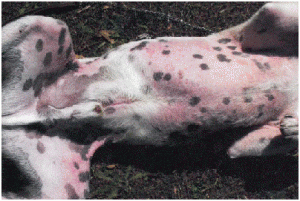How to Use Herbs in Treating Your Dog or Cat
Herbs are relatively safe and gentle medicines – most are very forgiving with fewer side effects compared to conventions medications. There is a synergy between the parts of the plants components, making herbal medicine safe, and effective.
The goal of using herbs is to enable your pet’s body to ultimately heal itself. To see how to incorporate herbal healing, let’s look at the example of a dog with chronic allergies.
Chronic Allergies
Allergies are caused by a variety of things. The most common causes are food, atopy (environmental), and parasites. This produces the secondary signs of chronic itching, infected skin, red lesions, pustules, thickened black skin, ear infections, and chronic paw licking.
Antibiotic and steroid therapies may make the symptoms disappear, but the underlying cause will continue, and the disease may be pushed deeper into your pet’s body to result in a much more serious disorder over time.
All forms of chronic skin disease have two things in common:
•All are connected to diet.
•All are less likely to occur in animals who have a healthy GI tract with good waste elimination, and strong immune systems.
Tonic herbs are used to gently support your pet’s cleansing systems – it makes it easier for your pet to heal himself.
Tonics: A Basic Formula for Chronic Skin Problems
•2 parts Burdock root, 1 part Dandelion, 1 part Red Clover, 1 part garlic powder.
•Tincture, tea, or the pressed juice of the fresh herb must be used.
•Flaxseed oil, evening primrose oil, borage seed oil, fish oil, or a prepared multi-essential fatty acid supplement should be fed along with this formula.
Dose: 1 tablespoon per forty pounds of your pet’s body weight daily.
This tonic will assist organ functions and help optimize the absorption of needed nutrients.
Herbal Symptomatic Relief
For animals with itchy skin, use an oatmeal based shampoo. Peppermint or lavender skin rinse is another option to help relieve itching.
If Itching is associated with minor redness, a daily skin rinse of cooled chamomile, plantain, or calendula tea may bring relief. Completely soak your pet with the tea, and allow your pet to drip dry.
If scabs or sores are present, try combining calendula and comfrey with sage or thyme tea in equal proportions. When cooled and used in a rinse, this will speed up the healing process and help prevent any bacterial infection.
With bacterial skin infection, use internal doses of Echinacea tincture, and use external doses of herbs such as Echinacea and Oregon Grape, or Goldenseal, in tincture or salve format.
For severe itching, using internal doses of licorice may bring relief. Licorice can help boost production of corticosteroids in the body and provide direct anti-inflammatory help. Use licorice only for short-term inflammatory flare-ups.
Herbal Remedies
Herbal treatments are a great alternative to conventional Veterinary Medicine. Conventional medicine will always have its place, but if we can avoid treating health problems using harsh drugs that cause a multitude of side effects, then our pets will be far better off. We will help them truly heal, and not just mask the symptoms, as is the case with most conventional medications.
Heal Your Pets At Home!
Best Wishes,
Dr Andrew J
P.S. In my Inner Circle you’ll get specific step by step instructions on exactly what herb to use, HOW to prepare the herb, and guidance as to when to seek veterinary care.
A great resource with hundreds of satisfied clients.
You can get access to the specific herbal instructions here:


You have to be careful with herbs. It is better to take your companion animal to a holistic vet or an herbalist who is familiar with what can harm animals. For example Dandelion should not be used for a dog with Kidney issues as it promotes urination.
If your dog is allergic to grains you should NOT use an oatmeal based shampoo. Please DO NOT USE any essential oils on your cats.
Skin issues can be so many things that all fall under the same symptoms. My vet long ago said allergies which seems to be their not sure answer after you’ve tried prescription shampoos, so we’ve been through numerous foods. Then I read about leaky gut/yeast related issues, so tried probiotics/enzymes and a grain/potato free food since a low carbohydrate diet is recommended. So far no cure but did read that it could be thyroid related.
Done with our standard vet, will be going to a holistic vet.
Dr. Jone’s est un tres bon vétérinaire holistic
Hello: My 9 yo Pit Bull has degenerative nerve disease. I have tried the 1 1/2 tablespoon organic flax oil 2 x a day and alpha lopoic acide one time a day. I’m feeding raw as much as possible with a blender of glop containing fruits and veggies, yogurt, apple cider vinigar,eggs with black strap molassas and vit c. It’s been 6 months and she still walks 2 30 min hikes with me daily. Oh and I got a book on accupuncture. So far so good. Thanks for your help.